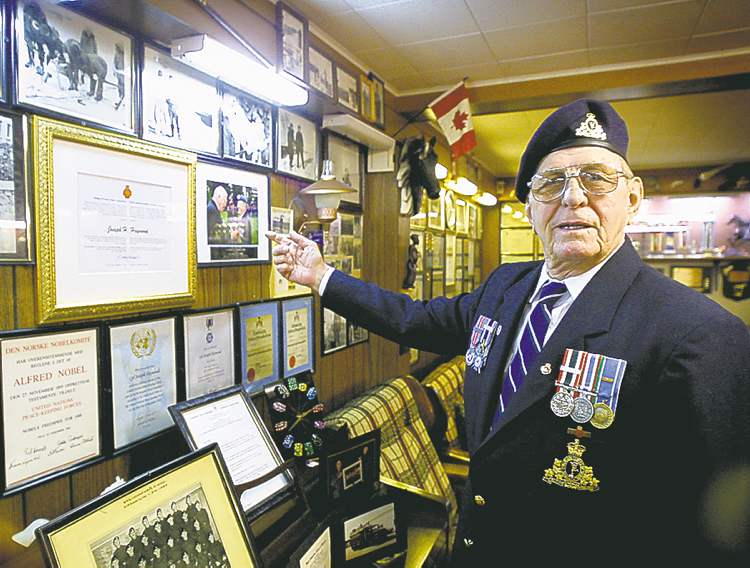From death row to advocacy, veteran turned tragedy around
Advertisement
Read this article for free:
or
Already have an account? Log in here »
To continue reading, please subscribe:
Monthly Digital Subscription
$1 per week for 24 weeks*
- Enjoy unlimited reading on winnipegfreepress.com
- Read the E-Edition, our digital replica newspaper
- Access News Break, our award-winning app
- Play interactive puzzles
*Billed as $4.00 plus GST every four weeks. After 24 weeks, price increases to the regular rate of $19.00 plus GST every four weeks. Offer available to new and qualified returning subscribers only. Cancel any time.
Monthly Digital Subscription
$4.75/week*
- Enjoy unlimited reading on winnipegfreepress.com
- Read the E-Edition, our digital replica newspaper
- Access News Break, our award-winning app
- Play interactive puzzles
*Billed as $19 plus GST every four weeks. Cancel any time.
To continue reading, please subscribe:
Add Free Press access to your Brandon Sun subscription for only an additional
$1 for the first 4 weeks*
*Your next subscription payment will increase by $1.00 and you will be charged $16.99 plus GST for four weeks. After four weeks, your payment will increase to $23.99 plus GST every four weeks.
Read unlimited articles for free today:
or
Already have an account? Log in here »
Hey there, time traveller!
This article was published 15/06/2012 (4875 days ago), so information in it may no longer be current.
For several months in 1968, Canadian Armed Forces Cpl. Joe Haywood didn’t know whether or not he would be executed for gunning down a defenceless man and woman in a St. Boniface house.
Haywood wasn’t. He was removed from death row after being convicted by a 12-man jury of manslaughter and sentenced to 12 years in prison for slaying the couple during a time when a psychiatrist testified Haywood’s mind was “impaired in some way and that he possibly confused the couple for his wife and the man she was associated with.”
It was only when the 18-year military veteran was in prison that he was first diagnosed with the impairment that caused him to kill the two people — post-traumatic stress disorder.

It was a diagnosis that sparked his life’s work, a campaign that culminated with PTSD being officially recognized by the Canadian government and military, and Canadian veterans getting the benefits and help they need.
Haywood died on June 8. He was 78.
Lt.-Col. Alexandra Heber, a Canadian Forces psychiatrist and clinical leader of mental health services at the Canadian Forces Health Services Centre, said in an interview from Ottawa that, while she didn’t know Haywood, what he did was amazing.
“To turn something so tragic and turn it around and become an advocate, he must have been quite an amazing man.”
Heber said PTSD, which is characterized as an anxiety disorder, affects about eight per cent of military personnel who are deployed into conflict.
Heber said because people know about PTSD, more military personnel come in earlier to be treated, in most cases successfully.
Haywood was convicted in May 1968 of slaying Angela Barker, 22, and Lawrence Wasylenko, 27, on Dec. 13, 1967.
Haywood suffered from PTSD after seeing action as a United Nations peacekeeper in the Belgian Congo in 1963. His condition worsened after he returned to Winnipeg and began abusing alcohol.
A psychiatrist later diagnosed Haywood with PTSD and, after he was paroled in 1972, he went on to run the Health Sciences Centre’s chemical-withdrawal unit for seven years.
During Haywood’s funeral, attended by more than 200 people on Thursday at the Norwood Legion, he was celebrated for his contributions to veterans and for his work helping people with alcohol and drug dependencies.
Haywood spoke at military bases across North America about PTSD and wrote Mr. God I am Sorry with former CJOB broadcaster Peter Warren.
Haywood was given a commendation by then veterans affairs minister Rey Pagtakhan in 2003.
He was a co-founder of Winnipeg’s Addictions Recovery Inc., as well as two halfway houses for alcohol and drug addictions.
David Munro, a director of the Canadian Peacekeeping Veterans Association, first met Haywood in 1953.
“He was a soldier’s soldier,” Munro said. “He contributed to the benefits of many veterans — we all owe him a debt of gratitude.”
Munro said even though Haywood is dead, he is vowing to continue pushing for him to be honoured with a Queen’s Jubilee medal this year.
World chuckwagon champion Kelly Sutherland said Haywood also was a rodeo judge who won several rodeo titles.
Sutherland said Haywood had great affinity for people fighting addictions.
“He always felt they should have a second chance, much like he did. He had a second chance and he spent most of his life trying to right the things he did wrong.”
Aaron Kim Johnston, producer of Russell Crowe’s first movie, For The Moment, and the movie The Last Winter, said Haywood helped train the horses used in both and became friends with Crowe.
“He was always on me about making his story, not for his sake, but for others’ sake.”
kevin.rollason@freepress.mb.ca

Kevin Rollason is a general assignment reporter at the Free Press. He graduated from Western University with a Masters of Journalism in 1985 and worked at the Winnipeg Sun until 1988, when he joined the Free Press. He has served as the Free Press’s city hall and law courts reporter and has won several awards, including a National Newspaper Award. Read more about Kevin.
Every piece of reporting Kevin produces is reviewed by an editing team before it is posted online or published in print — part of the Free Press‘s tradition, since 1872, of producing reliable independent journalism. Read more about Free Press’s history and mandate, and learn how our newsroom operates.
Our newsroom depends on a growing audience of readers to power our journalism. If you are not a paid reader, please consider becoming a subscriber.
Our newsroom depends on its audience of readers to power our journalism. Thank you for your support.


